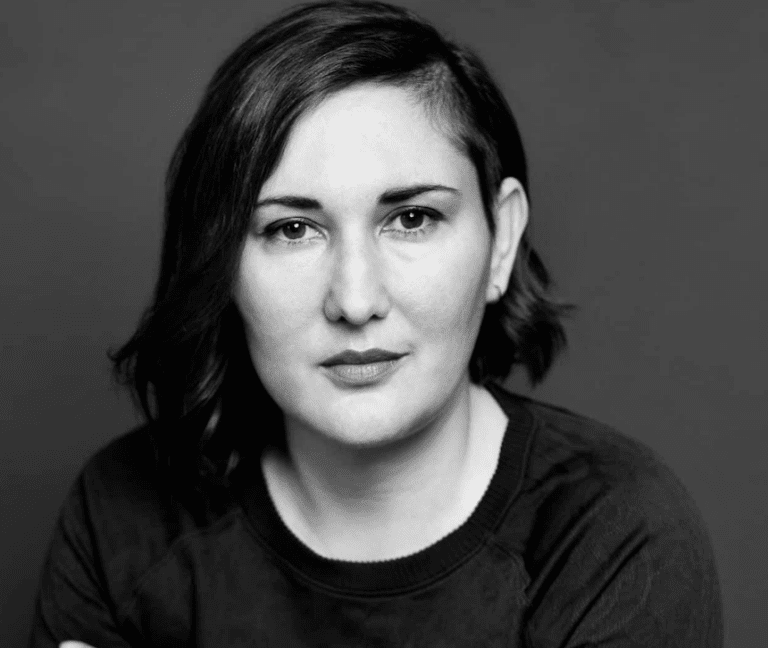Spotlight: Hailey Gillis
The first time I saw Hailey Gillis it was in a long, dimly lit hallway, a string of lights leading my path past tree stumps and vintage objects. At the end of the hallway was a wooden casket, its inhabitant leaning back and facing the oncoming audience. Lying in repose, arms crossed against her chest, was Gillis. Her dark brown hair and pale skin practically a scene from Snow White, another beauty known for magically spanning the bridge between reality and the afterlife.
This was in a performance of Soulpepper Theatre’s Spoon River, where Gillis, along with other Soulpepper ensemble members, sung the poems of Edgar Lee Masters set to music by Mike Ross as the deceased residents of Spoon River. It wasn’t her Soulpepper stage debut—that was 2014’s Idiot’s Delight—but it’s easy to spot a theme in the rest of her resume there: Marat/Sade, The Dead, Blood Wedding, The Dybbuk, The Crucible. Twenty-eight-year-old Gillis might have an ingenue look, but she’s made a career in roles that delve into the macabre, the supernatural, and the undead.

“That’s one of my hits, ghost girl,” Gillis says, fittingly, on lunch break at the Streetcar Crowsnest theatre where she’s rehearsing Dave Malloy’s Ghost Quartet, in a production by Crow’s Theatre and Eclipse Theatre Company directed by Marie Farsi running until November 3 (yes, there’s a performance on Halloween night). The song cycle premiered in 2014 in New York City before his best-known hit—the Tony Award-winning Natasha, Pierre, and the Great Comet of 1812, hit Broadway—where the New York Times called it “a rapturous little show” and “happily haunted.” But descriptors get more vague from then on. Part concept album, part whiskey-infused jam, part campfire ghost story session, Ghost Quartet is performed by four musicians (Gillis’ co-stars are Andrew Penner, Beau Dixon and Kira Guloien) who sing through intertwining stories that “span through many, many centuries and many, many realities,” Gillis says, and draw from storied fables like Scheherazade, the works of Edgar Allen Poe, and even Disney’s Frozen.
“The reason why I love Dave Malloy’s work so much is because he’s giving the audience a lot of their own agency to weave with us through those story lines, rather than trying to describe a really specific narrative or character line to them,” she says. “He really trusts his audience and so we really trust our audience. That’s rare.”
A Ghostly Sensation
For Gillis, the invitation that occurs between the show and the audience in Ghost Quartet exists in the music, which she grew up practicing as a kid in Grimsby, Ontario in a family with roots in Prince Edward Island and the east coast traditions of folk songs, kitchen parties and ceilidhs. Her interest in music and musical theatre was nurtured in small shows in Hamilton as a child, eventually landing her in the top six on season two of the CBC reality competition show Triple Sensation when she was only 16 years old.

But she’s the first person to admit that the bold and brassy musicals of Broadway aren’t where she sees herself at her most inspired. Like her starring roles in Musical Stage Company’s production of Onegin, Soulpepper’s original musical Rose, as well as Soulpepper’s concert series and Musical Stage Company’s UnCovered shows, which put a theatrical spin on pieces from popular music history, Gillis prefers opportunities that marry her acting and vocal skills, highlighting the unique qualities that music presents as a storytelling device—much like Malloy does in Ghost Quartet.
“For so long throughout history, the keeper of stories kept them through song and poetry. And there are certain songs in this show that feel like they’ve been written for forever, they have that gravitas and communal feeling where you feel like you could just join in somehow,” she says.
It’s that very quality about the timelessness of a certain style of song or of singing, the kind that invites others into it (either to sing along or just to listen closely), is why it works for a show about ghost stories, and perhaps why Gillis gets cast as one so often.

“What I think it’s doing is allowing us to travel time and space in a way that only music can. There are spoken scenes in this, but when we are asking the audience to come with us to a space that they might not recognize—like ghosts that can travel through walls or like time travelers—music allows us to easily release ourselves into that unknown space, while it also creeps into the back of our brains in a way that text just can’t,” she says.
Otherworldly & Original
With her narrative interest in music, it’s no wonder that Gillis is working on developing her own original musical along with her former Soulpepper Academy classmate Mikaela Davies and playwright Polly Phokeev. In fact, it’s likely that an original song clinched her spot in the Academy, which she joined after studying in the joint theatre program between the University of Toronto and Sheridan College. At a certain point in the audition process, prospective Academy members had to present a piece that illustrated how they had arrived at their current point in their career.
“Hailey went up there with her guitar and sang an original song,” says Peter Fernandes, a fellow former auditioner who would become her classmate and co-star in at least one production every year since, including the co-starring role in the musical Rose. But this was the first moment he ever saw Gillis perform. “It really changed the air in the room. I was like, ‘Holy smokes, if she doesn’t get into the Academy there’s no hope for me.’ She was revealing a part of herself, it was a really vulnerable place to be.”

And it wasn’t an isolated moment, Fernandes says. Even while workshopping Rose, in a small rehearsal never meant for an audience outside of the few artists in the room to work out ideas, he says her commitment and vulnerability brought him to tears.
“It was such a small moment in time, it was just for us, it was never going to happen again, and she just gave so much of herself to it. There’s so much heart behind her performance it’s moving, even in the early stages of a new work. What’s fantastic is that her ability to be vulnerable is what draws people to want to see her again and again,” he says. “My friends who aren’t in theatre, you know, they’ll come out to see Hailey Gillis. You know that’s something you’re not going to see every time. I can’t name a person like Hailey Gillis. I find it inspiring. And it rubs off on everyone she works with, we’re better artists for it.”
When asked to describe Gillis’s performance qualities, Fernandes, unprompted, chooses “otherworldly.”
“Her voice, it’s hard to compare to another artist I know. It hits you so deep,” he says.
But according to Kim Collier, who directed Gillis in a production of Romeo and Juliet at Vancouver’s Bard On the Beach, this isn’t limited only to her singing. “Some actors are ‘what you see is what you get.’ But Hailey has transformational properties,” she says.

“She has huge range. Perhaps it’s her deep compassion and connection to things beyond herself that allows her to be at once inhabited and otherworldly at the same time. She isn’t ever trying to imitate or mimic, she’s original… Hailey does not have ego getting in the way of slipping into the unknown, she is willing to travel beyond the known,” she says.
And even when performing the classics, Collier says Gillis doesn’t escape her foundation in music; “Hailey has a great sense of rhythm and this is so important when working with Shakespearian text, the words come alive fully embodied.”
Music & Magic
This tracks with how Gillis approaches every character she plays; where other actors might envision their character’s arc throughout a story, Gillis instead envisions a symphony, where all the various elements of an orchestra have their solo moments but eventually build to a moment where everything is playing together.

“Music has this extraordinary way of being math, like calculus, and also being incredibly poetic and spiritual and not definable,” she says. “‘What do you believe?’ is also a running theme [in Ghost Quartet]… There’s this thing of science versus religion, and I totally believe in science. But I think theatre is so spiritual, I get it from that. I understand people needing [spirituality] from other parts of life. I get it from the fact that I’m in a room having a communal experience with an audience and people on stage speaking poetry from 500 years ago.”
“I think all plays seem otherworldly to me. I think that’s why I’m so obsessed with composition and music, because it allows you to enter that subconscious, like the hair standing up on the back of your neck,” Gillis says. “It’s magic.”










Comments